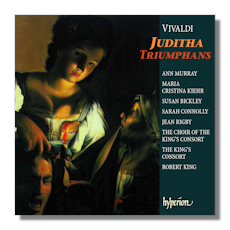
The Internet's Premier Classical Music Source
Related Links
- Vivaldi Reviews
- Latest Reviews
- More Reviews
-
By Composer
-
Collections
DVD & Blu-ray
Books
Concert Reviews
Articles/Interviews
Software
Audio
Search Amazon
Recommended Links
Site News
 CD Review
CD Review
Antonio Vivaldi

Juditha Triumphans
- Juditha - Ann Murray, mezzo
- Vagaus - Maria Cristina Kiehr, soprano
- Holofernes - Susan Bickley, mezzo
- Abra - Sarah Connolly, mezzo
- Ozias - Jean Rigby, mezzo
The King's Consort and Choir/Robert King
Hyperion CDA67281/2 2CDs recorded October 1997
Juditha Triumphans devicta Holofernes barbarie (RV 644) is the only one of Vivaldi's four cantatas to survive. It was written in 1716 while he was acting choirmaster of the Ospedale della Pietà, the girls' foundling home in Venice with which he was associated in one capacity or another for most of his life. The librettist was Giacomo Cassetti, a lawyer or doctor, who followed current fashions by using Latin instead of the vernacular and by abandoning a narrator in favor of moving the action along by the words and actions of the characters. The result was to bring the oratorio close to operatic style, though with greater reliance on the chorus and a grave and didactic tone more suitable for its devotional subject matter.
The familiar story of Judith, from the fourth book of the Apocrypha, was a favorite subject for oratorio writers of the 17th and 18th centuries. Cassetti's text departs from the Biblical narrative, however, reducing its complexity and putting more emphasis on its romantic interest than on Judith's heroism. In fact, Holofernes becomes more a lovesick swain than an evil barbarian, and after he falls madly in love with Judith at first sight, his decapitation at her hands comes as something of a shock. The Biblical Judith pretends to be a deserter and persuades Holofernes to wait for a sign from heaven; here she comes to plead for peace and simply waits for him to fall asleep. The conclusion puts the piece into an allegorical setting, by drawing a parallel between Judith and Holofernes on the one hand and the Venetians and the Ottoman Turks with whom they were at war on the other. The two-part structure is effective, with Part I ending aptly as the characters sit down to a banquet, which is what the listeners at the Pietà themselves probably did at intermission.
Vivaldi wrote masterfully for the voice. Here his cast was necessarily limited to women, but he uses them skillfully, with four mezzos and one soprano as principals (I find it strange that the chorus in this otherwise historically-informed performance includes men; this is surely an anachronistic, though of course it results in richer sound). Curiously, there is no ensemble singing – no duets, trios, etc. – and all the arias are in conventional da capo form. All of them are beautiful, and two in particular are exceptional: an exquisite song by Judith accompanied by a chalumeau (a precursor of the clarinet) in which they imitate the lament of a turtle-dove, and a florid display of anguish by Vagaus, Holofernes' steward, upon discovering the bloody body of his master. The scoring is unusually rich and colorful, using a variety of uncommon instruments and deploying them in various ways for the recitatives and arias.
This production is absolutely first-rate in every respect. Ann Murray's lustrous voice, purity of tone, and smooth legato make Judith's arias a delight, so does Maria Cristina Kiehr's light and bright soprano in the role of Vagaus, and the other three singers are just about as good. It takes a while to get used to the thin sound and low pitch (A=415 Hz) of the strings, but the King's Consort musicians are virtuosi on their old instruments and provide effective accompaniment throughout the piece. Robert King keeps it moving along at a good pace, and his sense of Baroque style is evident everywhere (not least in the tasteful ornamentation of the arias). The notes are interesting, the recorded sound is excellent and, all in all, this is a memorable and treasurable release.
Copyright © 1998, Alexander J. Morin


















